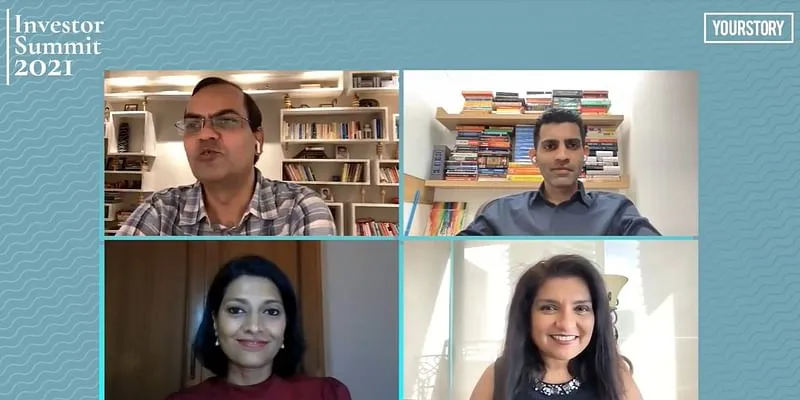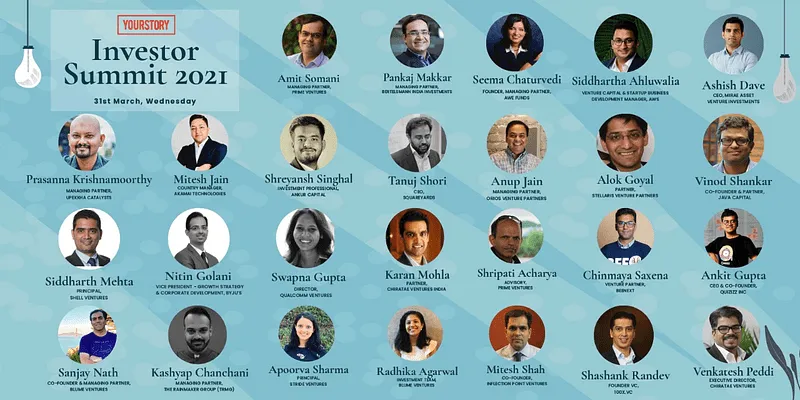India’s first-of-its-kind summit, YS’s Investor Summit 2021, was a resounding success, with impactful sessions setting the stage for the next Flipkart and BYJU’S to emerge from the country’s startup ecosystem. The summit saw an action-packed day with participation from investors and startups, all facilitated virtually.
An eclectic line-up of speakers
The high point of the summit was the line-up of speakers: Amit Somani, Managing Partner at Prime Ventures; Prasanna Krishnamoorthy, Managing Partner at Upekkha Catalyst; Ashish Dave, CEO of Mirae Asset Venture Investments (India); Nitin Golani, Vice President-Growth Strategy and Corporate Development at BYJU’s; Kashyap Chanchani, Managing Partner at The Rainmaker Group; Seema Chaturvedi, Founder and Managing Partner at AWE Funds; Rupesh Kumar Mishra, Co-founder of PagarBook; and Siddharth Mehta, Principal at Shell Ventures, among others.

A great time to be an entrepreneur
Delivering the welcome address, YS Founder and CEO Shradha Sharma said it was a great time to be an entrepreneur. “We’ve seen how even amidst the pandemic in 2020, investors continued to back disruptive companies, with investments of nearly $10 billion over 881 deals and around 1,476 active investors,” she said.
Shradha also spoke about how the venture capital (VC)-startup relationship had shifted from the earlier customary meeting in person to interacting virtually during the pandemic. “Given the lack of opportunities for interactions this year, we wanted to bring the investors to you. And help you have meaningful, relevant, and precise conversations. So make sure that you connect with every investor who is here today,” she said.
“Investment is a journey and not a one-time event,” she said. “The biggest outcome should be founders starting and building meaningful relationships with investors.”
Tailwinds for SaaS
A SaaS-oriented panel titled “Tailwinds in SaaS in 2021” discussed how more B2B companies were being founded now, which wasn’t the case 10 years ago.
The panel comprised Sanjay Nath, Co-founder and Managing Partner at Blume Ventures; Shripati Acharya, Advisory at Prime Venture Partners; Venkatesh Peddi, Executive Director of Chiratae Ventures; Alok Goyal, Partner at Stellaris Venture Partners; and Siddhartha Ahluwalia, Venture Capital and Startup Business Development Manager at Amazon Web Services.
On the growing investor interest in the sector, Shripati said: “The time taken to build large SaaS companies is smaller. What typically used to take seven-eight years can now be done in four years, which is within every fund’s target.”
Sanjay said the sector is “witnessing the rise of vertical SaaS and it is becoming a business model”. For Alok, the combination of excitability, higher velocity, and lower dilution made SaaS investments far more attractive than what they used to be in the past.
Recovery in tech investments
When asked to define disruptive innovations, Amit cited Prime Venture Partners’ approach in this regard. “Whatever solution you are building, think of what can make it 10X better,” he said.
“We are back to pre-COVID levels. There’s no slowdown in terms of companies getting funded or entrepreneurs starting up,” he said about the current tech investment landscape.
“The canvas is broad and the ecosystem far more deeper,” said Ashish, adding that entrepreneurial activity has increased significantly.
“Venture funds like massive markets and India will continue to take the lion’s share when it comes to capital. We are far more capable of creating something and selling globally,” he said.
Seema said companies in India are not just catering to the Indian consumer story; they are brands selling to a global consumer base. Because of this, there are enhanced possibilities of exits, she added.
“Building a product-minded culture, product-led growth culture, and not relying on paid digital marketing is what needs to be cracked,” Amit said about the next focus areas in investment. “The distribution is going to be as important as the product.”

The most suitable funding routes
An investor panel on startup funding with Rupesh Mishra, Co-Founder of PagarBook; Mitesh Shah, Co-Founder of Inflection Point Ventures; and Apoorva Sharma, Principal at Stride Ventures said funding avenues such as bootstrapping, debt, and equity funding—all have their merits when approached and leveraged correctly.
Rupesh said PagarBook never planned for funding. “We kept solving for what the customers wanted and are a customer-focused company. This helped us scale fast.”
Regarding which funding route startups should take, he said, “If there’s an opportunity to raise money in a seed round, Series A and B, then a founder should look at raising equity funds or money from institutional VCs rather than raising debt funding.”
Mitesh said fundraising wasn’t just about getting the cash flow and having money. He advised founders to have like-minded investors at the table. “Founders mistake funding to be a milestone. They need to understand that with funding, there comes a greater amount of responsibility. Funding is important, but it cannot be the only goal.”
On the role of debt financing, Apoorva said it is a very important mix in the capital structure. “There are some predictable use cases, which should always be financed through debt instead of diluting your shareholding by raising equity capital,” she said.
She added that debt funding had evolved a lot and is now more founder-friendly.
The role of corporate venture capital
A three-member panel offered insights into the emerging and evolving corporate venture capital (CVC) landscape and helped understand the shift in founders’ choices for venture funding.
The panel featured Swapna Gupta, Director of Qualcomm Ventures; Anup Jain, Managing Partner at Orios Venture Partners; and Tanuj Shori, CEO of Square Yards.
“Corporate venture capital is very relevant for the startup ecosystem,” said Swapna. “We often hear that startups are eating corporates for lunch, but the point is that corporates can’t move without startups and vice versa.”
Anup said access to CVC partnership means “more skin in the game and active mentoring, and if that happens, magic happens”.
He said: “Every Indian business house should find their own motto, define their vision for the next 20 years, where and at what stage the startups will play a role, and then design a team based on the objectives.
“There however isn’t enough information about CVCs, which could be due to various media policies. The ecosystem has a new crop of startups every day and it is important for CVCs to be out there just like an angel investor, VCs, and others.”
Tanuj said CVC adds a lot of value to the ecosystem as startups can learn how large businesses run and get access to branding, coverage, and industry connections.
It is important for corporate entities to put a formalised structure in place, said Swapna. “I want to see more corporates build a team that’s put together to build an ecosystem, invest, and help the startups grow.”
Offbeat yet high-value sectors for investment
Asked about untapped and emerging growth opportunities in the startup ecosystem, Shreyansh Singhal, Senior Investment Associate at Ankur Capital, said offbeat sectors are a core focus area for investments. “We’ve looked at opportunities ranging from material science and material tech to alternative proteins,” he said.
Radhika Agarwal, Investment Team, Blume Ventures, said since a VC’s job is to bet on the future, Blume’s investment philosophy has always been to look at exciting edge cases. “Every two years there have been interesting market shifts. Jio, UPI, or COVID-19 pandemic have changed how demand forces have operated,” she said.
Creative networking formats
The summit also brought together a well-thought-through and practical-oriented set of sessions to connect investors and attendees with the help of multiple creative networking formats. This included “matchmaking” sessions, where participants were put into groups on the basis of criteria such as origin, industry, and funding stage to help them find their perfect match.
Attendees could also directly connect with a person of interest via a chat or schedule a call to exchange ideas and explore new business opportunities.
The summit featured specially curated “campfire” sessions led by carefully selected industry experts, who shared their insights and knowledge with attendees. .
There was also an interesting “roulette” networking format, in which participants could “bump into” other attendees such as corporate representatives, investors, startup founders, and aspiring entrepreneurs on randomly assigned five-minute video calls.

![You are currently viewing [Investor Summit 2021] Key takeaways from India’s first-of-its-kind summit](https://blog.digitalsevaa.com/wp-content/uploads/2021/04/Imagef4y9-1617209955080.jpg)








